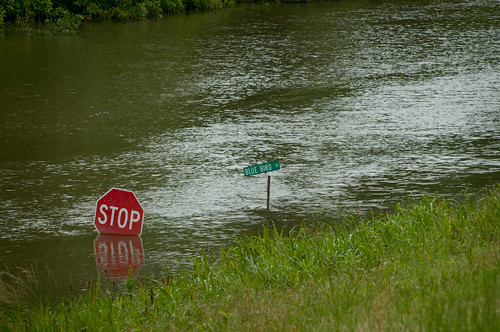 Mark Hertsgaard's HOT: Living Through the Next Fifty Years on Earth envisions what sort of planet the author's daughter is going to live in as a consequence of how we're altering the climate now -- and inquires what we can do to mitigate or, failing that, adapt to coming changes. Hertsgaard had been writing about climate disruption for mainstream media outlets for 20 years; the arrival of his own child gave him a focus reflected here. This is a readable approach to the difficult reality that so many of us hope someone else will understand and deal with.
Mark Hertsgaard's HOT: Living Through the Next Fifty Years on Earth envisions what sort of planet the author's daughter is going to live in as a consequence of how we're altering the climate now -- and inquires what we can do to mitigate or, failing that, adapt to coming changes. Hertsgaard had been writing about climate disruption for mainstream media outlets for 20 years; the arrival of his own child gave him a focus reflected here. This is a readable approach to the difficult reality that so many of us hope someone else will understand and deal with.I came away with two main lessons:
- Whatever public event, project, or happening I may be looking at, I need to ask how does the fact of climate change/global warming play out in relation to it. As the former Kings County Executive (Seattle) Ron Sims put it, I've learned to
For example, as I discussed here, it seems necessary to ask whether European anxiety about climate change refugees pushed north toward their continent has a role in French and Italian enthusiasm for the Libya war."Ask the climate question."
- How successfully our species (and many other species) get through this radical change from our past environment will depend on whether our political institutions can achieve a good enough balance between wide citizen buy-in to adaptation and scientific and technical understanding and invention. We can survive what we have made and we will, but how catastrophic the consequences of climate change become will depend significantly on whether we can make political systems designed for other challenges work for this one.
There's a conversation that's hard to imagine anywhere in the United States. We just don't trust that governments are our own creations, working for the general welfare."But what about the farmers who live here?" [Hertsgaard] asked. "What happens to them if this land becomes a lake?"
"We will buy them out;' said Leusink. "They will be paid a fair price."
"What if they don't want to be bought out?"
"They have no choice;' he replied. "This decision was made in a coordinated fashion by the provincial government, the federal government, and the national water board. We had an open, democratic process. We spent four years talking it through at the local level. But finally you must act. You cannot allow one or two people to block an action that is best for everyone else."
I couldn't help thinking about this comparison as I read current reports about Mississippi River flooding, about the Corps of Engineers opening the Morganza spillway to spare Baton Rouge and New Orleans by inundating vast swathes of Cajun country. I don't know whether this "100 year flood" should be considered a consequence of climate change or just a fluke. I do know that a lot of people found themselves involuntarily leaving their homes and the commerce of this entire region profoundly disrupted. This flood may or may not be directly attributable to global warming, but the poor preparation of our governments to deal with it seems a portent of worse things to come.Louisiana's [storm surge] efforts have been crippled by the state's history of poor government, its dysfunctional relationship with the Army Corps of Engineers, the power of its oil and gas interests, its continuing reluctance -- even after Katrina -- to acknowledge the reality of global warming for fear that might harm oil and gas production, and an abhorrence of taxes and public planning as somehow socialistic. (Only after Katrina did Louisiana adopt a statewide building code.)

Floods waters from Mississippi River inundated Tunica Cutout, MS on Sunday, May 15. 2011. The entire population was relocated nearby to the protected side of the levee. USDA photo by Lance Cheung.
No comments:
Post a Comment